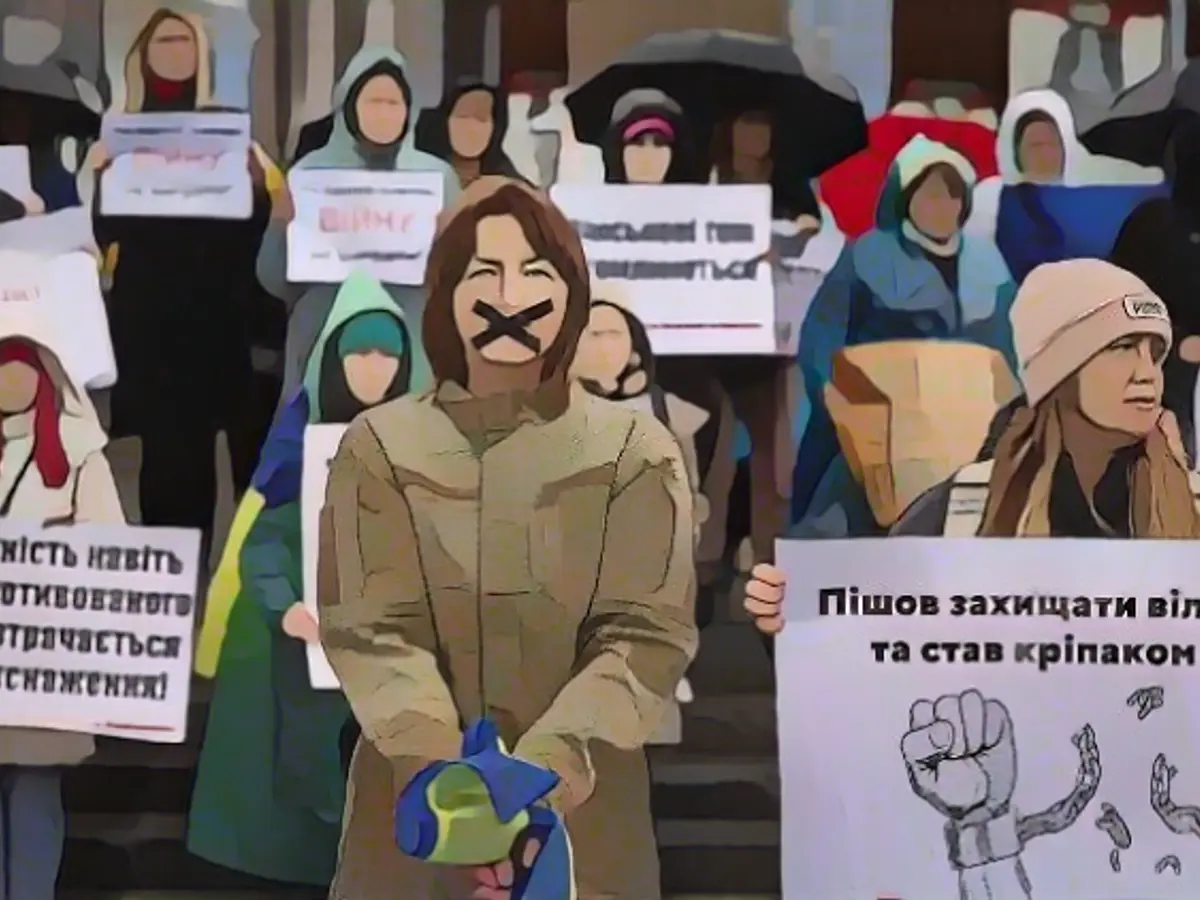Ukrainian women protest against their husbands' indefinite military service
Olexandr is actually a university lecturer. He has been fighting almost continuously on the front line against the Russian invasion for more than a year and a half. The soldiers are exhausted, says his wife. Like thousands of others in Ukraine, she is campaigning for temporary military service. Meanwhile, Kiev is trying to strengthen the army.
When Antonina Danylevych's husband joined the Ukrainian army in March 2022 shortly after the start of the war, he joined the long queues outside the conscription office. Men signed up in droves to defend their country against the Russian invaders. Today there are no longer long queues, says Danylevich. The 43-year-old personnel manager gave her blessing back then when her husband Olexandr went to war with tens of thousands of men. Today, she finds it difficult to come to terms with this. Since being called up, Olexandr has had just 25 days home leave. The two children are growing up without a father.
There is no end in sight to the war. It is taking its toll on people - on the soldiers, their families and friends. And it is taking an ever greater toll. "We want Ukraine to win," says Antonina Danylevych in her home in the capital Kiev. "But not through the efforts of the same people all the time." The soldiers need to be replaced, they also need rest, she explains, "but for some reason others don't understand that." The women on the home front should also have become stronger, she adds. "But at what cost did we become stronger?"

Her husband Olexandr worked as a lecturer at the university. He had no combat experience when he joined the military. Today he is a platoon commander in the fourth armored brigade. His 14-year-old daughter misses her father dearly. Olexandr watched his son's wedding this year on his cell phone via a video call from the front - in Bachmut, that bitterly fought over and destroyed city in eastern Ukraine. In February, it will be two years since Russia began its invasion. Like many others, Antonina's family has to come to terms with the fact that the war will go on for a long time - much longer than they had hoped. Some people now concede that there is no guarantee of victory.
Protest against indefinite military service despite ban
In the fall, Antonina Danylevych signed a petition to President Volodymyr Zelensky calling for temporary military service. Around 25,000 people signed the petition and demanded that soldiers be given a clear timetable for their release from military service. There were also two demonstrations in the center of Kiev, in which 50 to 100 people took part. The martial law imposed at the beginning of the war prohibits public demonstrations. And yet they are taking place. A year ago, when the Ukrainian soldiers pushed the Russian troops back from Kiev and even recaptured parts of the north-east and south, such protests would have been unthinkable.
A year ago, the fighting morale of the entire nation reached its peak. Today, however, the counter-offensive launched in the summer has failed to achieve a breakthrough. Winter is beginning. Russia is stepping up its drone and missile attacks on the electricity and heating supply. Ukrainian and Russian soldiers face each other in a pitched battle. The front lines hardly change. And the question is becoming ever louder as to whether the urgently needed military aid from abroad will be provided as quickly and as extensively as before. Ukraine needed weapons worth several billion dollars from the USA and other allies in order to maintain its war effort. Supplies of artillery shells, for example, are now running low and foreign countries are holding back on aid. Not only because Ukraine is failing to achieve visible military success, but also because a new president will be elected in the USA in 2024, for example.
In addition to such external factors, the government in Kiev is facing internal ones. It is faced with the difficult decision of calling up enough recruits to stand up to the much larger Russian army on the one hand and providing enough manpower to keep the economy going on the other. The mobilization only affected men between the ages of 27 and 60. Anyone between the ages of 18 and 26 cannot be called up, but can volunteer. According to its own figures, Ukraine has one million people under arms. Men of military age are prohibited from going abroad.
Conscription papers handed over in the subway
The mobilization programme is a state secret, as is the number of soldiers killed and injured on the battlefields. The Ukrainian military leadership wants to prevent a stalemate in the war of attrition, which would ultimately benefit Russia. The plan presented this month therefore focuses on strengthening capabilities in the areas of air force, electronic warfare, drones, artillery defense and mine clearance.

At the same time, it points to the limited capacities in the training of soldiers and sees legal loopholes that could be used to evade mobilization. A uniform register of conscripts is therefore to be introduced and the categories for conscription expanded. Recruitment is a problem. It takes place largely in private. Men are stopped on the street, in the subway or at checkpoints and handed their enlistment papers. They are instructed to report to the recruitment centers. Videos appeared on social media showing men being literally dragged away and threatened. A public outcry followed. There is also outrage because there are repeated cases of conscripts evading military service through bribery.
Corruption in recruitment offices apparently widespread
Selensky was forced to dismiss all the heads of the regional recruitment offices in the summer. Hardly a week goes by without a criminal case being announced against employees of the military service offices for accepting money for forged documents to enable men to evade mobilization. The bribes range from 500 to 10,000 dollars. The government is also working on a law to prevent people over the age of 30 from evading military service by studying. According to one MP, parliament is also planning to draft a law by the end of the year to improve the procedure for enlistment and discharge from military service.
On the banks of the Tisza River, which flows from southwestern Ukraine into Romania, border guards, who normally deal with cigarette smugglers, have arrested around 6,000 people trying to flee the war effort. One border guard reports that at least 19 people drowned in the process. "They died in vain. They died in the river even though they could have contributed to the war effort."
Trust in the government is declining
All of this is leading to a decline in the population's trust in the government. Some sociologists have identified an increasingly gloomy mood. Anton Hrushetskyi, Managing Director of the International Institute of Sociology in Kiev, says that trust in the government has fallen from 74% in 2022 to 39%. In parliament, it fell from 58 to 21 percent. "We had hoped that we would have been in a better position this fall than we are." Now winter is approaching.
Antonina Danylevych prepares her home for the cold. "I am depressed. I know the challenges of winter. And when there's heavy shelling, when the power and heating go out, I have to cope with it alone." Other women feel the same way. In the summer, Danylevych came across a group of almost 3,000 like-minded people on Telegram who are campaigning for the right of war veterans to demobilize. Most of them are wives, mothers and family members of soldiers. "Many of the women take sleeping pills and tranquilizers," reports Danylevych. Resignation is spreading. But there is also resentment. At the end of October, Danylevych's group demonstrated for the first time on Independence Square in Kiev in favor of a time limit on military service. They then wrote a letter to Zelensky. The police did not intervene. There was another demonstration in mid-November. One demonstrator held up a sign that read: "My husband and my father have given others the time to prepare. It's time to change the first people!"
- Despite the ongoing 'Attack on Ukraine' by Russia, Ukrainian women like Antonina Danylevych are advocating for temporary military service to alleviate the burden on soldiers and their families.
- The 'Military' situation in Ukraine has impacted families deeply, with women like Antonina Danylevych struggling with their husbands' prolonged absences due to indefinite service, leading to children growing up without a father.
- Amid 'Wars and conflicts', calls for reform within the 'Ukrainian' military have emerged, with citizens protesting for clear timelines for soldiers' release from service and pushing for stronger support for families on the home front.
Source: www.ntv.de








